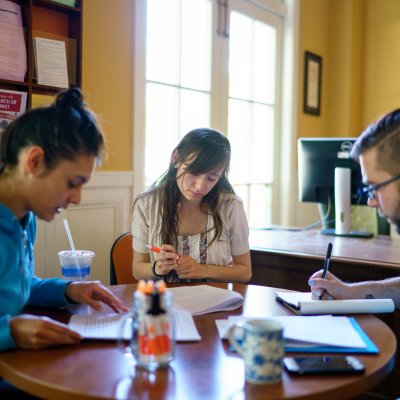About CWAC

CWAC pedagogy is founded upon collaboration, readerly dialogue, and service-learning.
Mission
At the Center for Writing Across the Curriculum (CWAC), we offer guidance and resources to enhance the writing of a global community of learners at Saint Mary's College of California. Inspired by the Lasallian tradition of service through education, we meet writers where they are, lead thoughtful conversations, and provide encouragement in an inclusive and productive space.
Who are we?
- We advise peer students through 1-1 sessions, Writing Circles, and collaborative workshops for diverse disciplines.
- We support all writers as they enter more fully into scholarly dialogue, sharpening their skills, building their confidence, and connecting writing strategies across contexts.
- We are guided by the Burkean Parlor model of cooperative dialogue and pursue the construction and expression of knowledge through shared inquiry.
- We offer faculty development workshops to inspire the sharing of ideas among peers who are teaching Writing in the Disciplines or Collegiate Seminar courses.
- We award and publish excellent student writing and art.
We're not all English majors; in fact, we study diverse disciplines, from business to environmental science to integral and beyond. Read about and get to know us!
Frederick Alesna - Writing Adviser
- Class: 2026
- Major: Integral
- Fun Fact: I was a member of my high school marching band!
Isabella Bony - Writing Adviser
- Class: 2028
- Major: double majors in Global Studies & Anthropology
- Fun Fact: I love doing martial arts and have a black belt in Jujitsu!
Zane Briggs Waterman - Writing Adviser
- Class: 2026
- Major: Psychology, minor in Creative Writing
- Fun Fact: My family currently has 11 pets total - please feel free to ask me about them anytime!
James Carrillo - MFA Fellow
- Class: 2026
- Major: Fiction
- Fun Fact: I used to bowl in tournaments as a kid!
Felicia Coleman - Writing Adviser
- Class: 2027
- Major: Journalism, Communications
Molly Floberg - Writing Adviser
- Class: 2026
- Major: English & Creative Writing
- Fun Fact: I'm writing a book!
Zachary Kim - Writing Adviser
- Class: 2028
- Major: Integral
- Fun Fact: I am a massive sports fan!
Rachel McGrandle - Writing Adviser
- Class: 2027
- Major: English & Creative Writing
- Fun Fact: I love reading, hanging out with friends, and knitting. Something unique about me is that I read 330 books last year!
Bryce Miller - Writing Adviser
- Class:
- Major:
- Fun Fact:
Rowen Murphy - Writing Adviser
- Class: 2026
- Major: Creative Writing, minor in Communications
- Fun Fact: I have a crystal collection, and it would be my greatest joy to expand it until I have one of every specimen!
Emma Owen Dildine - Writing Adviser
- Class: 2027
- Major: English & Psychology
- Fun Fact: I have a twin!
Drew Paxman - Lead Writing Adviser
- Class: 2027
- Major: Politics & Media Production double major, minor in Creative Writing
- Fun Fact: I played varsity tennis in high school and still enjoy playing for fun!
Matteo Romo - Writing Adviser
- Class: 2028
- Major: English SSTE
- Fun Fact: I'm a huge fan of Dungeons and Dragons!
Sevanah Sandoval - Writing Adviser
- Class: 2028
- Major: English & Creative Writing
- Fun Fact: My favorite Disney Channel show is "The Suite Life of Zack and Cody!"
Camryn Smith - Lead Writing Adviser
- Class: 2027
- Major: Psychology
- Fun Fact: I play softball at SMC!
Griffin Stenzel - Writing Adviser
- Class: 2028
- Major: English: Film, Drama & Cultural Studies Concentration
- Fun Fact: I own every Beatles album on vinyl!
Facilitators come from a variety of backgrounds, but they have a lot in common. They're all continuously training and developing their skills as facilitators, and they love talking to students about writing. Sign up for a Circle and get to know them:
- Joe Zeccardi, Adjunct Professor, CWAC & TASC Director
- Chase Manning, Adjunct Professor
- Jennifer Burnside, Adjunct Professor
- James Carrillo, MFA Fellow
In CWAC, we never tell anyone what to write, and we never correct papers. We do teach mini-lessons, guiding writers to learn how to analyze their work and how to apply particular strategies.
Different disciplines place unique demands on writing. As Michael Pemberton argues, Writing In the Disciplines (WID) sessions should be characterized by “parity, a balance of power,” not an absence of power but rather a harmonious balance of students’ authority over disciplinary knowledge and advisers’ authority about writing. This allows writers to enter sessions as the “experts” of their texts and also prevents them from passively taking in the suggestions of the advisers.
Readerly, collaborative response is a particularly good fit for Saint Mary’s because students are accustomed to seminar-style dialogue. Writers tend to walk into CWAC ready to discuss. They tend to walk away with more clarity about their own ideas, more strategies for improving their writing, and more confidence in themselves as contributors to the scholarly dialogue.
More about CWAC

Civic Engagement
We help others while learning about their disciplines, we grow as writers alongside our peers, and we continually reflect on issues impacting our Saint Mary’s community.
Readerly Dialogue
Advisers ask open-ended questions, responding as readers, in order to guide writers to deeply explore what they are learning and what they are trying to communicate.
Collaboration
Everyone brings knowledge to the table – the writer brings disciplinary expertise, and the adviser brings writing strategies. Advisers guide writers to read aloud and post-outline their drafts – to highlight main ideas or specific features, in order to compare what’s on the page with what the writer is trying to accomplish. Advisers also guide writers to diagnose and revise for grammar and style.